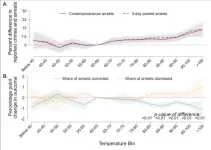(Press-News.org) UVA Health researchers have developed a powerful new risk assessment tool for predicting outcomes in heart failure patients. The researchers have made the tool publicly available for free to clinicians.
The new tool improves on existing risk assessment tools for heart failure by harnessing the power of machine learning (ML) and artificial intelligence (AI) to determine patient-specific risks of developing unfavorable outcomes with heart failure.
“Heart failure is a progressive condition that affects not only quality of life but quantity as well. All heart failure patients are not the same. Each patient is on a spectrum along the continuum of risk of suffering adverse outcomes,” said researcher Sula Mazimba, MD, a heart failure expert. “Identifying the degree of risk for each patient promises to help clinicians tailor therapies to improve outcomes.”
About Heart Failure
Heart failure occurs when the heart is unable to pump enough blood for the body’s needs. This can lead to fatigue, weakness, swollen legs and feet and, ultimately, death. Heart failure is a progressive condition, so it is extremely important for clinicians to be able to identify patients at risk of adverse outcomes.
Further, heart failure is a growing problem. More than 6 million Americans already have heart failure, and that number is expected to increase to more than 8 million by 2030. The UVA researchers developed their new model, called CARNA, to improve care for these patients. (Finding new ways to improve care for patients across Virginia and beyond is a key component of UVA Health’s first-ever 10-year strategic plan.)
The researchers developed their model using anonymized data drawn from thousands of patients enrolled in heart failure clinical trials previously funded by the National Institutes of Health’s National Heart, Lung and Blood Institute. Putting the model to the test, they found it outperformed existing predictors for determining how a broad spectrum of patients would fare in areas such as the need for heart surgery or transplant, the risk of rehospitalization and the risk of death.
The researchers attribute the model’s success to the use of ML/AI and the inclusion of “hemodynamic” clinical data, which describe how blood circulates through the heart, lungs and the rest of the body.
“This model presents a breakthrough because it ingests complex sets of data and can make decisions even among missing and conflicting factors,” said researcher Josephine Lamp, of the University of Virginia School of Engineering’s Department of Computer Science. “It is really exciting because the model intelligently presents and summarizes risk factors reducing decision burden so clinicians can quickly make treatment decisions.”
By using the model, doctors will be better equipped to personalize care to individual patients, helping them live longer, healthier lives, the researchers hope.
“The collaborative research environment at the University of Virginia made this work possible by bringing together experts in heart failure, computer science, data science and statistics,” said researcher Kenneth Bilchick, MD, a cardiologist at UVA Health. “Multidisciplinary biomedical research that integrates talented computer scientists like Josephine Lamp with experts in clinical medicine will be critical to helping our patients benefit from AI in the coming years and decades.”
Findings Published
The researchers have made their new tool available online for free at https://github.com/jozieLamp/CARNA.
In addition, they have published the results of their evaluation of CARNA in the American Heart Journal. The research team consisted of Lamp, Yuxin Wu, Steven Lamp, Prince Afriyie, Nicholas Ashur, Bilchick, Khadijah Breathett, Younghoon Kwon, Song Li, Nishaki Mehta, Edward Rojas Pena, Lu Feng and Mazimba. The researchers have no financial interest in the work.
The project was based on one of the winning submissions to the National Heart, Lung and Blood Institute’s Big Data Analysis Challenge: Creating New Paradigms for Heart Failure Research. The work was supported by the National Science Foundation Graduate Research Fellowship, grant 842490, and NHLBI grants R56HL159216, K01HL142848 and L30HL148881.
To keep up with the latest medical research news from UVA, subscribe to the Making of Medicine blog.
END
Artificial intelligence tool to improve heart failure care
2024-05-14
ELSE PRESS RELEASES FROM THIS DATE:
People without an inner voice have poorer verbal memory
2024-05-14
Previously, it was commonly assumed that having an inner voice had to be a human universal. But in recent years, researchers have become aware that not all people share this experience.
According to postdoc and linguist Johanne Nedergård from the University of Copenhagen, people describe the condition of living without an inner voice as time-consuming and difficult because they must spend time and effort translating their thoughts into words:
“Some say that they think in pictures and then translate the pictures into words when they need to say ...
Courtship through flute song in Indigenous Southern Plains culture #ASA186
2024-05-14
OTTAWA, Ontario, May 14, 2024 – Every love story is unique, and in traditional Indigenous Southern Plains culture, it begins with an original ballad performed on the flute. In order to win a lover’s affection, and respect among the tribe, each pursuer must compose one good flute serenade.
Paula Conlon, a former music professor at the University of Oklahoma, has researched the history and cultural significance of the Indigenous flute since the 1980s. Conlon will present her work Tuesday, May 14, at 9:45 a.m. EDT as part of a joint meeting of the Acoustical Society of America and the Canadian Acoustical ...
SwRI investigating unusual substorm in Earth’s magnetotail using MMS data
2024-05-14
SAN ANTONIO — May 14, 2024 —Southwest Research Institute is investigating an unusual event in the Earth’s magnetotail, the elongated portion of the planet’s magnetosphere trailing away from the Sun. Using data from NASA’s Magnetospheric Multiscale (MMS) mission, SwRI scientists are examining the nature of substorms, fleeting disturbances in the magnetotail that release energy and often cause aurorae.
Since their launch in 2015, the MMS spacecraft have been surveying the magnetopause, the boundary between the magnetosphere ...
Mislabelled shark meat rampant in Australian markets, study finds
2024-05-14
Researchers at Macquarie University have found a significant portion of shark meat sold in Australian fish markets and takeaway shops is mislabelled, including several samples from threatened species.
The findings, published in the journal Marine and Freshwater Research this month, highlight the ineffectiveness of seafood labelling and the grave implications for both consumer choice and shark conservation.
Researchers collected 91 samples of shark meat from 28 retailers across six Australian states and territories and used DNA ...
90% of Floridians believe climate change is happening
2024-05-14
The latest edition of Florida Atlantic University’s “Florida Climate Resilience Survey,” found that 90% of Floridians believe that climate change is happening. In comparison, a recent Yale University survey showed 72% of all Americans believe climate change is happening. The FAU survey includes questions on beliefs about climate change, experience with extreme weather events and support for climate-related policies.
The Florida Climate Resilience Survey also shows belief in human-caused climate change has surged among Florida Independents while slipping among Republicans in the state since last fall.
But despite these changes, the latest edition of the survey ...
Using artificial intelligence to speed up and improve the most computationally-intensive aspects of plasma physics in fusion
2024-05-14
The intricate dance of atoms fusing and releasing energy has fascinated scientists for decades. Now, human ingenuity and artificial intelligence are coming together at the U.S. Department of Energy’s (DOE) Princeton Plasma Physics Laboratory (PPPL) to solve one of humankind’s most pressing issues: generating clean, reliable energy from fusing plasma.
Unlike traditional computer code, machine learning — a type of artificially intelligent software — isn’t simply a list of instructions. Machine learning is software that can analyze data, infer relationships between features, learn from this new knowledge and adapt. PPPL researchers ...
A new perspective reviews pork’s place in global sustainable healthy diets
2024-05-14
A new food systems perspective study1 published in Advances in Nutrition from the University of Washington is the first to explore the place of fresh pork in in the global food sustainability framework.
Merging data on food composition, food trends, prices and incomes, the study concluded that pork meat is an affordable high-quality protein and may have a lower environmental (GHGE) impact than previously believed. The perspective also makes clear pork is well positioned to meet the rising global demand for animal protein.
Pork is one of the most consumed meats globally,2 providing high quality protein and several priority ...
Heat’s effects on police and judges
2024-05-14
High temperatures affect the decision-making of police officers and judges. Previous research has shown that heat can increase criminal activity, with the leading theory proposing that heat reduces emotional control and increases aggression. A. Patrick Behrer and Valentin Bolotnyy investigate the effects of heat on the behavior of those who respond to criminal activity. The authors analyzed records of 10 million arrests across the state of Texas from 2010 through 2017, along with the legal outcomes that followed each arrest. These data were merged with daily temperature data. Police made fewer arrests per reported crime on the hottest days in the sample, and these arrests were ...
Scientists unlock mysteries of orangutan communication
2024-05-14
In a new study published in PeerJ Life & Environment, scientists have revealed the intricate vocal patterns of Bornean orangutans, shedding new light on the complexities of their communication. Titled "Vocal Complexity in the Long Calls of Bornean Orangutans," the research, led by Dr. Wendy Erb from the K. Lisa Yang Center for Conservation Bioacoustics at the Cornell Lab of Ornithology, unveils the remarkable diversity and variability within orangutan long call vocalizations.
Orangutans, the charismatic great apes of Southeast Asia, are known for their complex social behaviors and vocal communication. However, understanding the nuances of their vocal repertoire ...
Researchers create human aortic aneurysm model to advance disease understanding, treatment testing
2024-05-14
Using human cells in laboratory rats, Michigan Medicine researchers have developed a functional model of thoracic aortic aneurysm, creating opportunities for more effective understanding of disease development and treatments for the potentially fatal condition, a study suggests.
There are currently no medical treatments for thoracic aortic aneurysm, which is a weakening and bulging at the body’s largest blood vessel in the chest.
The aneurysm often does not cause any symptoms and must ...







